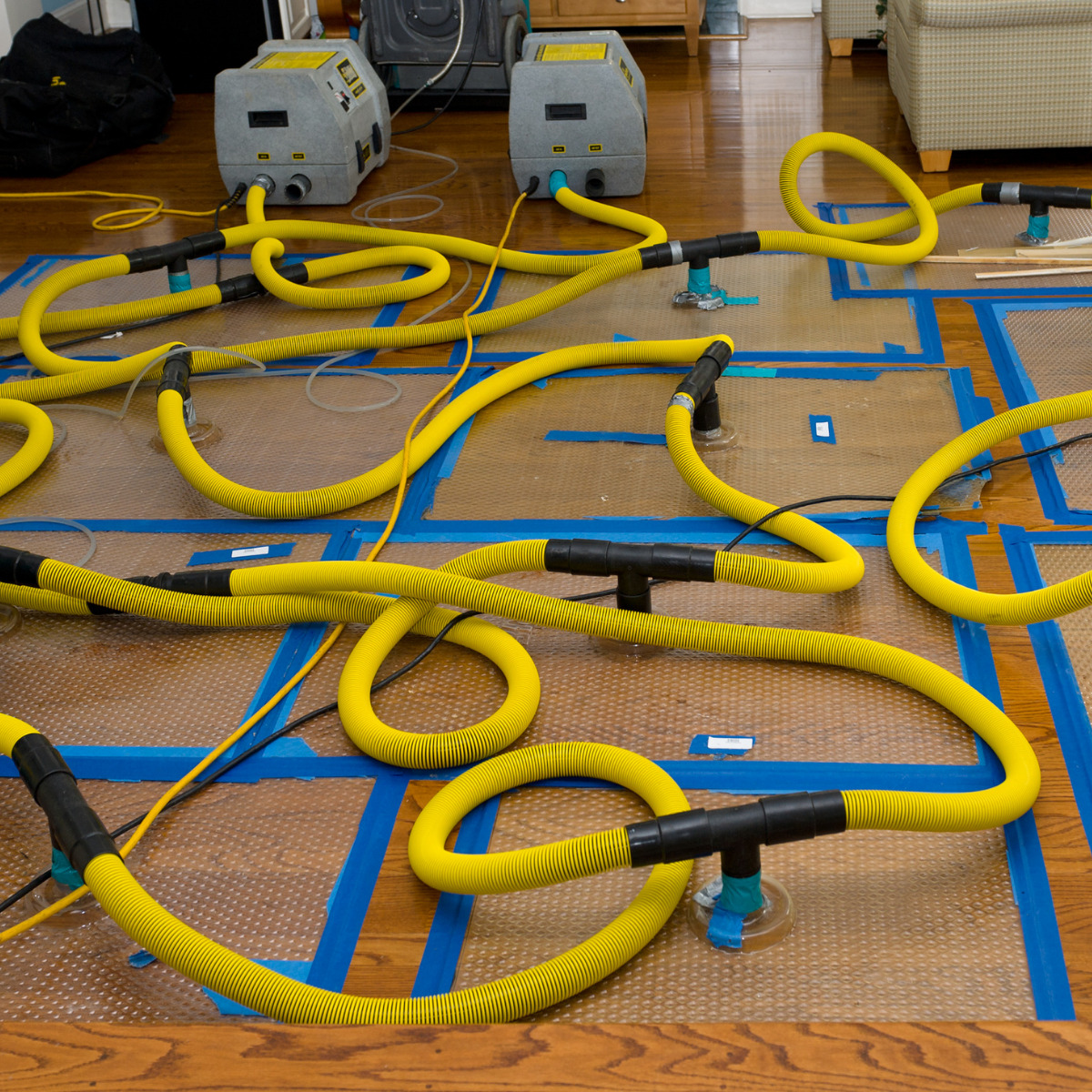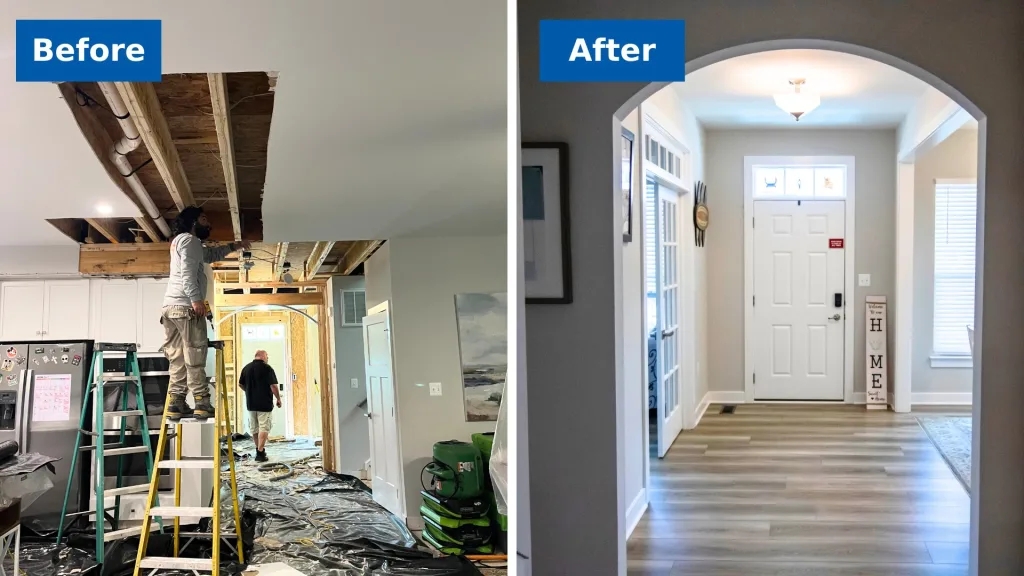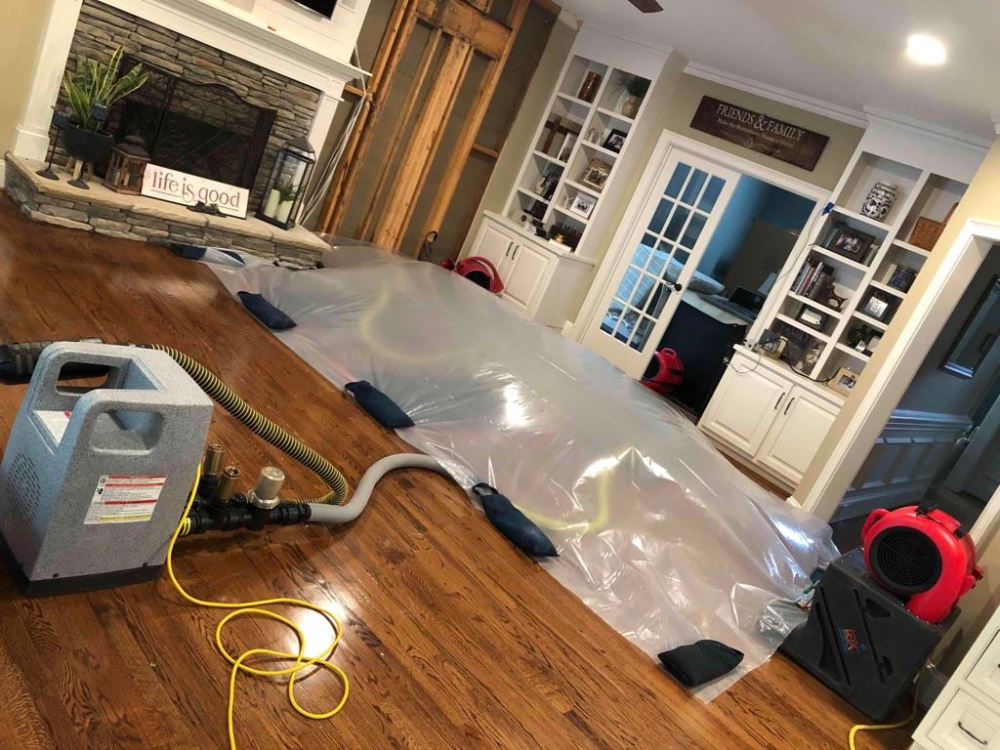The Real Cost of Skipping Timely Water Damage Repair
The Real Cost of Skipping Timely Water Damage Repair
Blog Article
Vital Actions to Adhere To for Reliable Water Damages Remediation in Your Home
When confronted with water damage in your house, recognizing the crucial actions for efficient repair can make all the difference. You need to analyze the damage and assurance security before dealing with the problem. Quiting the source of water is vital, however it's just the start. There's a collection of actions you have to take to shield your building from more problems when you have actually taken care of that. Let's explore what you should do next.
Assess the Damages
The very first action is to evaluate the damage thoroughly when you uncover water damage in your home. Start by determining the source of the water breach. Check for leaks, ruptured pipes, or other concerns causing the problem. Next off, take a look at the affected locations for visible signs of damage, including warping, mold and mildew, or staining growth. Do not forget to search in covert places like behind walls or under flooring, as water can permeate into these areas unnoticed.Document the damage by taking clear photos and notes. This will assist you when going over the situation with your insurance coverage copyright or restoration experts. Focus on the kind of materials impacted, as different products need various reconstruction approaches. Examine the level of the damage. Is it small or extensive? Recognizing the range will lead you in making a decision whether to manage it yourself or call in the professionals for an extra comprehensive remediation process.

Ensure Safety and security
Prior to you begin any type of reconstruction work, assuring your security is necessary. First, evaluate the problem of your home. If the water's deep or if you see electrical risks, don't go into the location. Shut off the electrical power and gas supply to avoid mishaps. Use protective gear like boots, masks, and handwear covers to shield yourself from impurities or mold.It's vital to stay aware of your environments; look for unsafe surface areas and sharp objects. Treat it as dangerous waste if the water is from a sewer backup. Maintain family pets and youngsters away from influenced areas to stay clear of exposure.Once you have actually taken these safety measures, you can proceed with the restoration procedure. Remember, your safety and security comes first, and if you're ever before uncertain, it's finest to get in touch with an expert. Taking these steps will assist assure you prepare to tackle the reconstruction securely and properly.
Stop the Resource of Water
After guaranteeing your safety, the following action is to quit the resource of water. Recognize where the leak is originating from. Maybe a ruptured pipe, a malfunctioning device, or even hefty rain entering via a damaged roofing system. Transform off the main water supply to your home to stop additional flooding if it's a pipes concern. For appliances, disconnect them and turn off their water supply valves.If the resource is outdoors, like rain, try to divert it far from your home making use of sandbags or various other obstacles. For small leakages, you may be able to utilize tape or a sealer temporarily till an expert can repair it. Bear in mind, addressing the source quickly is vital to reducing damage and preventing mold development. When you've stopped the water, you'll remain in a better position to go on to the next action in the repair process.

Get Rid Of Excess Water
Act promptly to get rid of excess water, as standing water can lead to much more considerable damage and mold development. Collect your tools: a wet/dry vacuum cleaner, buckets, and towels. You can use towels to soak up the dampness if the water is shallow. For much deeper water, a wet/dry vacuum is your best option. See to it to clear the vacuum regularly to prevent overflow.If the water is infected, like from a sewer backup, wear safety equipment, consisting of masks and gloves, to maintain yourself safe. As soon as you have actually removed as much water as possible, look for surprise pockets of wetness in edges and under furnishings, as these can harbor mold.Don' t neglect to transform off electric devices and power electrical outlets in wet locations to stop risks. This first step is vital in minimizing damages and establishing the phase for an effective remediation procedure.
Dry and Dehumidify the Location
It's necessary to dry and evaporate the area completely once you have actually gotten rid of the excess water. Start by utilizing dehumidifiers effectively to pull dampness out of the air and prevent mold development. Keep an eye on humidity degrees to assure the area dries completely.
Eliminate Standing Water
To effectively tackle water damages, you need to concentrate on getting rid of standing water as swiftly as feasible. Begin by collecting required devices, like a wet/dry vacuum cleaner or a pump, depending upon the quantity of water. If the water is shallow, a vacuum cleaner should work. For bigger amounts, a pump is extra efficient. While working, see to it to put on safety equipment to maintain on your own secure from contaminants. As you remove the water, pay interest to hidden areas like under furniture or in edges where water could collect. Once you've gotten rid of the bulk, your room will certainly begin to dry out. This step is crucial, as lingering water can cause mold growth and more substantial damages.
Usage Dehumidifiers Effectively
Just how can you effectively make use of dehumidifiers to dry and evaporate your room? Beginning by putting your dehumidifier in the most afflicted area, ideally where water damage is most serious. Make certain to shut all windows and doors to develop a sealed atmosphere. Switch on the dehumidifier and set it to the ideal moisture level, typically around 30-50%. Empty the water collection tank regularly, or think about utilizing a design with a constant drainage choice for benefit. When possible, utilize fans to improve air movement, assisting the dehumidifier work much more successfully. Maintain the dehumidifier running up until you're confident that the location is completely dried, preventing mold and mildew growth and additional damages (Smoke Damage Restoration). This step is necessary for efficient water damage repair
Screen Moisture Levels
Monitoring humidity levels is vital during the drying process, as it aids ensure your room stays totally free from excess moisture. Buy a reputable hygrometer to track moisture accurately. Ideally, you wish to maintain levels between 30% and 50%. You might require to adjust your fans or dehumidifiers to improve airflow if moisture readings rise above this variety. Inspect the readings consistently, specifically in areas prone to moisture, like shower rooms or cellars. Consider increasing air flow or making use of added dehumidifiers if you observe consistent high moisture. Remaining on top of these levels not only speeds up the drying process yet also avoids mold and mildew growth, ensuring your home stays comfortable and risk-free.
Clean and Disinfect Affected Surfaces

Restore and Repair Your Home
After cleansing and sanitizing the influenced areas, it's time to bring back and fix your home. Begin by assessing the damages. Check for architectural problems, like weakened floorings or walls, and resolve any kind of essential repair services. Changing damaged drywall or floor covering is vital for both looks and safety.If your furniture or items were influenced, think about whether they can be recovered or require substitute. Tidy or expertly recover products where possible.Next, paint walls and touch up any kind of locations that need interest. This not only boosts look yet additionally secures surfaces from future water damage.Don' t neglect to examine your pipes and home appliances for leakages, ensuring every little thing's working correctly. Ultimately, take into consideration installing a dehumidifier to avoid future moisture problems. By taking these steps, you'll restore your home to its former glory and create a much safer living atmosphere.
Frequently Asked Inquiries
Just How Lengthy Does Water Damages Restoration Generally Take?
Water damage reconstruction normally takes anywhere from a couple of days to numerous weeks, depending on the degree of the damages (Flood Damage Restoration). You'll desire to evaluate the scenario swiftly to decrease further issues and guarantee appropriate reconstruction
Will My Insurance Coverage Cover Water Damage Repair Prices?
Your insurance might cover water damage repair prices, yet it depends upon your policy. Examine your coverage details and call your insurance coverage agent to clarify what's consisted of and what you need to sue.
Can I Manage Water Damage Reconstruction Myself?
You can manage water damages reconstruction yourself, yet it's vital to evaluate the situation initially. If it's extensive, you could wish to call experts. Always focus on safety and security and my site guarantee you've obtained the right tools.
What Are the Indications of Hidden Water Damages?
You could discover indicators of surprise water damages like deformed walls, musty smells, or staining. If your floors feel spongy or you area mold and mildew, it's time to examine further prior to the circumstance gets worse.
Exactly How Can I Stop Future Water Damages in My Home?
To stop future water damages in your house, you need to regularly examine plumbing, seal splits, preserve seamless gutters, and warranty appropriate drainage. Installing a sump pump and wetness obstacles can also help keep your space completely dry. When you uncover water damage in your home, the initial action is to evaluate the damage completely. Act quickly to get rid of excess water, as standing water can lead to more considerable damages and mold growth. To successfully tackle water damage, you require to focus on getting rid of standing water as swiftly as possible. As you remove the water, pay focus to hidden locations like under furnishings or in edges where water may collect. Water damage repair normally takes anywhere from a few days to numerous weeks, depending on the degree of the damages.
Report this page